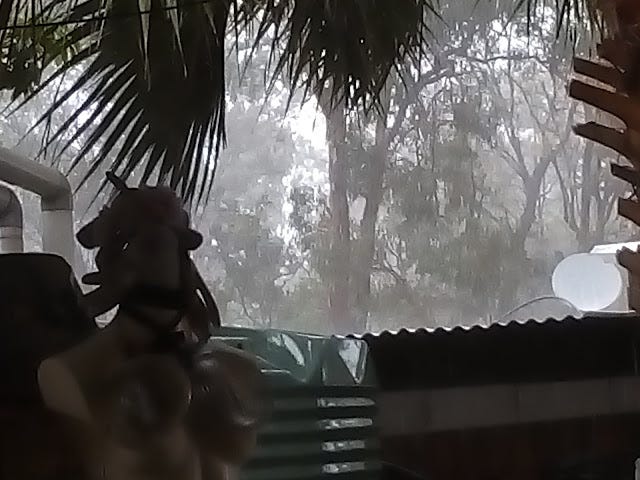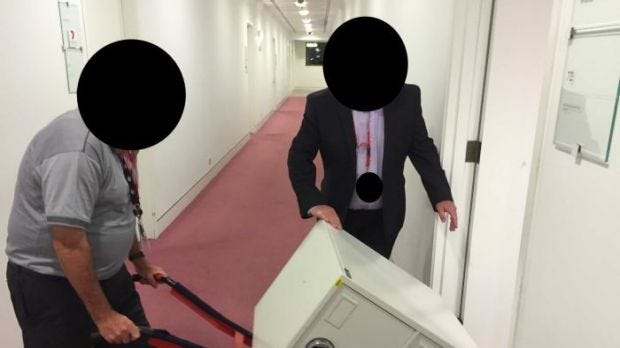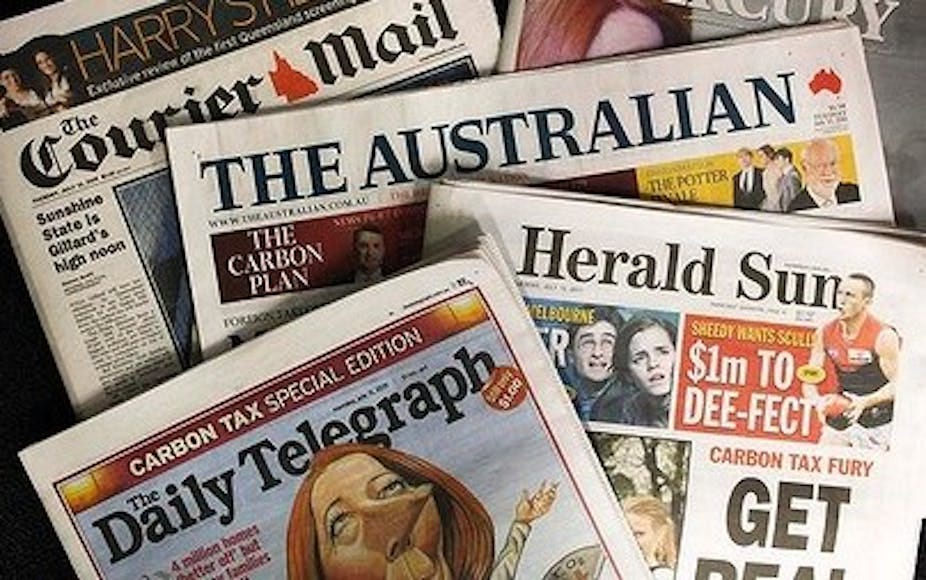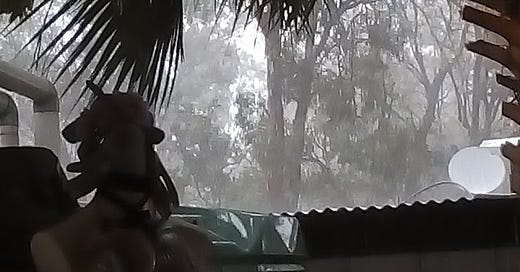
Backyard Scene, Queensland
There was no phone or internet at the house, in the national tragedy that was the National Broadband Network, sold to the public as the Information Superhighway of the future. Costs for the chronically mismanaged fiasco, already at more than $50 billion, were streaming upwards towards $90 billion.
And nothing much else worked in the place either, as the country plunged backwards into the Dark Ages.
In the petris dish where all life happened.
Australia was a microcosm of a broader chaos.
A high hallucinatory screech, a lost cause, a wing that flapped faroff, a sky that was instead a roof of dripping ectoplasm, all these things he could see as he looked down across the suburb.
Squashed in reckless regulation, the voices diminished, the integrity and originality and natural creativity all hidebound, suppressed. They came out of the darkness, they really did, these forces destroying the country. No one could act so stupid. No one could be so naive. He played an elaborate dance with the national security agencies, because everybody was under surveillance now, most especially journalists.
And yet at exactly same time, exquisite timing, as there were headlines over journalists being jailed for 20 years for possessing government documents, hundreds of supposedly secret files were found in a cabinet in a secondhand store. And promptly delivered to the National Broadcaster.
Who decided what was sensitive? Who decided what was secret?
They did. And they classified everything, just to be on the safe side.
A runaway government, no political oversight, a populace robbed of their voice, they were all the strappings of an authoritarian state. All that remained was to officially declare it such. To dispense with the farce of elections. To jail dissenters. Harass, bully and threaten journalists, once seen as an essential and important part of a modern participatory democracy, now seen as the enemy. To imprison anyone who disagreed with the government narrative that we were a successful, prosperous, peaceful multicultural society. To string up on the rafters of social ridicule any nonconformist.
For surveillance was harassment, and the taxpayer funded agencies were the biggest bullies of all.
Disarm the population. Feed them bullshit. Tell stories to undermine credibility. To set loose the AIs to monitor everybody, every communication, every breath, every private orgasm.
That was what they were like, these people. The worst perves, unleashed.
These grotty, imagination free donkeys.
But insults would get him nowhere. Just as cooperation got him nowhere.
Old Alex could feel the magic stirrings of a vast debate. Could feel the threat, the enveloping silence. A Mhadahomaden had returned to the area. They were instructed to be quiet. Tread carefully. He could feel them moving in the reaches. They wanted him to be frightened, terrified of Allah, to embrace the Lord of All The Worlds and submit. He could see the spirits streaming across the landscape. He could see the wizards and their false trails, ordering entrails. There was now a different order of being.
Bodhisattva in British(ˌbəʊdɪˈsætvə , -wə, ˌbɒd-, ˌbəʊdiːˈsʌtvə ) noun
(in Mahayana Buddhism) a divine being worthy of nirvana who remains on the human plane to help men to salvation.
On a different plain, almost a wider joke in the microcosm of this place, apropos of virtually nothing but the broader insanity of Australian politics, Kevin Rudd was threatening to sue the Australian Broadcasting Corporation, that body which had given voice to the greatest ego in the land, sycophantically channelling his garbage propaganda on everything from climate change to the "folks out there" to his folk legend as a child to his supposed saving of the country from the Global Financial Crisis, concealing all manner of bastardry, over-arching incompetence and astonishing wastes of public money.
The former prime minister Kevin Rudd is suing the ABC over a report that claimed he was warned of “critical risks” of his government’s home insulation program before the deaths of four young installers in 2010.
The ABC reported on Wednesday that Rudd and the senior Labor MPs Julia Gillard, Wayne Swan and Lindsay Tanner were warned in a report to cabinet in 2009 that their national rollout of subsidised home insulation – part of an economic stimulus package – faced “critical risks”. The report emphasised it was unclear if “critical risks” referred to safety concerns.
High Farce and Comic Book Secrets.
THE BIGGER STORY:

Andrew Wilkie, Chris Bowen both raise concerns about reputational damage over security
AFP disputes story that it lost hundreds of national security documents over five-year period
Department that launched investigation says it's working closely with AFP, ASIO and ABC
There are warnings Australia's relationship with its allies may be in jeopardy, after a massive security breach and release of top-secret cabinet documents.
Hundreds of classified files obtained by the ABC have now been secured by the nation's top spy agency, after it was revealed the papers were found in two filing cabinets purchased at an ex-government furniture sale.
The major blunder has revealed the inner workings of five separate governments, sparking fears it will alarm Australia's security and intelligence allies.
"It sends a signal to our intelligence partners and allies that Australia might not be trustworthy when it comes to sharing information and intelligence with us," independent federal MP and former intelligence analyst Andrew Wilkie said.
Labor frontbencher Chris Bowen said the bungle was "comic, but yet unbelievably serious".
"This is embarrassing for the country, it is embarrassing to our allies who share intelligence with us and assume that we will be able to keep it," Mr Bowen said.
"This is a blunder of massive proportions."

Journalists sent sensitive government documents could face charges under new treason laws that “criminalise journalism”, media companies and the union have warned.
Media companies, including News Corp Australia, which publishes The Australian, say new laws aimed at fighting growing foreign interference could see journalists, editorial support staff and lawyers jailed for possessing classified information, even before publishing.
University, business, legal and religious groups appeared before a parliamentary joint committee on intelligence and security hearing, arguing that new foreign interference legislation was too broad and did not involve adequate consultation.
News Corp head of government affairs Georgia-Kate Schubert said as well as being too broad, it was also unclear whether the bill regulated digital media, which could hit newspaper advertising revenue in a sector struggling to compete with digital giants, including Google and Facebook.
Ms Schubert told the committee that if digital media faced different regulations, foreign companies could avoid advertising with traditional media because of the regulatory risks.
“It’s not clear if the bill doesn’t actually apply to digital platforms that distribute content, so the application of the law penalises traditional media companies … it creates an uneven commercial playing field,” she said.
Media companies also expressed concerns that the laws could lead to a “lack of vibrancy” in Australian media markets.
Foxtel corporate affairs group director Bruce Meagher said the laws could force them to stop broadcasting channels, including Al Jazeera and the BBC, owned by foreign states and the company did not have the resources to monitor and determine whether these programs aimed to influence domestic political debate.
He said if Foxtel broadcast a National Geographic documentary about the Great Barrier Reef that urged viewers to take the issue up with the federal government, it was unclear whether they would have to report the program to authorities.
Media companies, including Free TV, called for, at the minimum, “vast exemptions” for the media.



